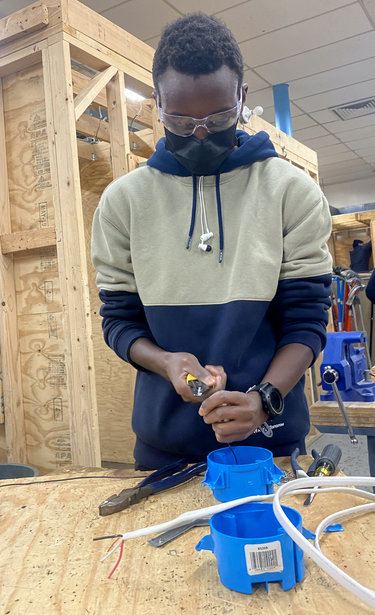Despite late state budget, GCSD endorses $120M spending plan for next year
GUILDERLAND — When Guilderland school district voters go to the polls on May 16, they will be deciding on a $120 million school budget.
All eight members of the school board present at the April 4 meeting voted in favor of the spending plan.
The $119,772,194 proposed budget is a 8.99-percent increase over this year’s budget; the 2.96-percent levy increase stays under the state-set tax cap by $237,891, meaning a simple majority vote is needed for the budget to pass.
Very few changes were made since Superintendent Marie Wiles presented her draft on March 7.
“The significant cost drivers,” as outlined by Assistant Superintendent for Business Andrew Van Alstyne, remain borrowing for capital projects, health-insurance increases, contract transportation costs, fuel costs, special-education services, and refunding taxes along with legal expenses for defending assessments when they are challenged.
However, the final budget shows a $100,000 reduction in the line for tax certiorari cases. At the April 4 meeting, the board accepted what Van Alstyne called “a meaningful savings on a large refund.” A settlement with the Northeastern Industrial Park reduced the school district’s payment to a little over $125,000.
The industrial park’s assessment had been reduced by the court from about $73 million to about $43 million so the school district was ordered to refund about $1.4 million. After the trial, negotiations led to a settlement that will save the school district $126,250.
The district’s “largest discretionary investment” in next year’s budget is to reduce middle-school class size. This year, class size for eighth grade wss reduced and next year, if the budget passes, classes for sixth- and seventh-graders will be smaller.
Van Alstyne stressed that the budget proposal maintains existing programs and services and said, “This was almost across the board one of the top priorities from stakeholders.”
The budget, he noted, also includes a school resource officer at the middle school, more hours for monitors, and new teaching posts for special education and for English as a new language. Athletic offerings have been expanded with e-sports, more coaching for track and cross-country, and a unified bocce team.
A last-minute addition is more funding for career technical education. Since the Albany Board of Cooperative Educational Services campus was filled, the additional Guilderland students will attend classes at the Schoharie campus.
Wiles called it an “unexpected and actually very wonderful increased interest in CTE that we wanted to accommodate.”
State aid
The state budget had not been set on April 4 when the school board adopted its budget. The legislature extended the April 1 deadline first to April 10 and then again to April 17.
Guilderland’s state aid, according to the governor’s budget, would increase an unprecedented 22.8 percent for next year, up about $7 million to $37.5 million.
State and federal aid together would account for about $37.8 million while property taxes are to pay for about $80 million, up about $2 million from this year.
Board member Judy Slack asked on April 4 what would happen if the state aid promised by the governor in her executive budget was not forthcoming.
“Are we just up a creek?” asked Slack.
Van Alstyne noted that legislative members had spoken in favor of the full restoration of Foundation Aid promised by Kathy Hochul. “And the state settled a legal case that, if they don’t fund it, and don’t maintain other funding, it triggers a reopening. And so we don’t know but we are operating with the assumption that it would be fully funded.”
Wiles said that not having the state budget set by April 1, as required by law, “is a little bit of a flashback.”
She recalled, “We would all build our school district budgets on the governor’s proposal because that was kind of the floor.”
Among local school districts, before New York set a statewide voting date for school budgets, Berne-Knox-Westerlo used to wait to adopt its budget until after the state budget was set.
Van Alstyne noted that the negotiations currently taking place on the state budget “are largely not about education.” Rather, they are about affordable housing and criminal-justice reform.
“It’s still weird though, right?,” said board President Seeema Rivera. “To make a budget based on another budget that’s not done yet.”
Board member Nathan Sabourin asked about the percentage of Foundation Aid that the governor wanted each school district to set aside for “high-intensity tutoring.”
He called the 5.4 percent “a significant amount of money.”
“We have done some homework 101 to see what’s out there for high-impact tutoring,” Wiles responded. “We’re hearing that neither of the houses are in favor of a set-aside of Foundation Aid. So right now, we just have it sitting there — it’s part of the budget,” Wiles said of the aid that might be designated for tutoring.
“When we have clarity on what strings are attached to the use of the money, then we’ll go forward,” she said. “If we have to use it for high-intensity tutoring, we can. If not, it can offset costs related to providing additional supports for students who are struggling.”
Van Alstyne said, “We’ve already started pursuing potential paths for using those funds for high-impact intensive tutoring where we’d be required to do so.”
He mentioned Tableau, describing it as a “really impressive piece of software that lets us really effectively drill down into student performance.”
Wiles concluded of the 2023-24 budget, “On some levels, this was a fortunate year that we were able to maintain everything that we have been doing and lower the class sizes in the middle school, which was a huge priority, and begin to transition items that were funded by our federal dollars into he general fund.
“So I think we’re in a very good spot. And we also are pretty certain we won’t be getting any more money when the state budget is passed.”
Elections
Also on May 16, school district voters will elect three candidates to the school board.
The incumbents who are up for re-election — Kim Blasiak, Rebecca Butterfield, and Judy Slack — told The Enterprise earlier that they were collecting names for the petitions needed to run. Slack said her decision to run would be based on who else is in the race while Blasiak and Butterfield said they were committed to running.
The posts are unpaid and the terms run for three years.
Petitions have to be submitted to the district clerk by 5 p.m on April 17 with the names of 96 eligible voters, which is 2 percent of those who voted in the election last May.
Candidates must be at least 18 years old, must be able to read and write, must have lived in the district for at least a year, and must be a qualified voter.
Residents who are not registered to vote may do so through the Albany County board of Elections or they may register through the school district.
Residents may register at their local elementary school or at the district office from 8:30 a.m. to 4:30 p.m. on one of three days: Thursday, May 4; Monday, May 8; or Tuesday, May 9.
Voters must be United States citizens, must be18 or older, and must have lived in the district for at least 30 days.



